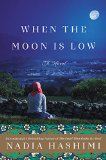Summary | Excerpt | Reading Guide | Reviews | Beyond the Book | Read-Alikes | Genres & Themes | Author Bio

A Novel
by Nadia HashimiThis article relates to When the Moon Is Low
When the Moon is Low has Fereiba narrate much of the action as she flees Afghanistan, along with her children, for refuge in England. While Fereiba's story is one of escape, there are countless women left behind who must endure daily life in a country where the Taliban's extremely stifling laws leave a suffocating footprint.
The Afghan Women's Writing Project (AWWP) was founded in 2009 as an outlet for the country's women to share their stories and experiences. In November of 1999, Zarmeena, an Afghan mother of seven was executed by the Taliban in Kabul's Ghazi stadium as punishment for having killed her husband. A video of that outrageous act made its way to the founder of AWWP, Masha Hamilton, who became convinced that Zarmeena's story was layered with nuance and was possibly one of courage. Hamilton was thwarted by attempts to dig deeper into the story because of the secrecy in a society where silence is the norm.
As a journalist, Hamilton believes that the ability to share our stories is just as essential to our survival as food and shelter. The AWWP aids Afghani women in doing just that and is the first step to empowering them — the women learn computer skills and the confidence they gain from their work being published as part of the AWWP project, helps them gain entry into jobs and fields in a male-dominated society.
 The women contribute stories, essays, or poems in English (especially commendable given that English is not their first language), and they are mentored by a volunteer team of writers and editors through online collaboration. Final contributions are published on the AWWP website. Writing themes run the gamut from what it is like living in Taliban-controlled territory to being under burqa and the sorrow of war. The daily joys of living — walking in a spring morning for example — are also celebrated through these voices.
The women contribute stories, essays, or poems in English (especially commendable given that English is not their first language), and they are mentored by a volunteer team of writers and editors through online collaboration. Final contributions are published on the AWWP website. Writing themes run the gamut from what it is like living in Taliban-controlled territory to being under burqa and the sorrow of war. The daily joys of living — walking in a spring morning for example — are also celebrated through these voices.
AWWP also has an Oral History Project which collects stories from women who are illiterate but who want to share their thoughts. AWWP writers record and transcribe these stories. The AWWP has also published anthologies of the women's poems and writings, which are available for purchase on the non-profit organization's website.
Since its inception the foundation has helped over 90 women who have participated in a mentorship program. Programs for teenagers are also available. While workshops and salons are also held in Dari, one of Afghanistan's two official languages, writing is almost always in English as an outcome of the women themselves indicating an interest in strengthening their shaky knowledge of the language. It is important to note that many learned English while in refugee camps so English is not necessarily for the privileged in the country.
The foundation works primarily through donations of time and money. The general public is encouraged to donate and to host what are called "living room fundraisers" where participants share readings from the AWWP and give to the cause.
Further reading: To put the above in context, it might help to revisit the key players in the region and get a sense for Afghanistan through much of the '80s.
Photo from Daikondi, Afghanistan by AWWP writer, Arifa
Filed under Places, Cultures & Identities
![]() This "beyond the book article" relates to When the Moon Is Low. It originally ran in October 2015 and has been updated for the
April 2016 paperback edition.
Go to magazine.
This "beyond the book article" relates to When the Moon Is Low. It originally ran in October 2015 and has been updated for the
April 2016 paperback edition.
Go to magazine.
Your guide toexceptional books
BookBrowse seeks out and recommends the best in contemporary fiction and nonfiction—books that not only engage and entertain but also deepen our understanding of ourselves and the world around us.